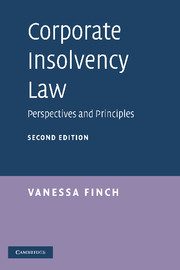Book contents
- Frontmatter
- Contents
- Acknowledgements
- Table of cases
- Table of statutes and other instruments
- List of abbreviations
- Introduction to the second edition
- PART I Agendas and objectives
- PART II The context of corporate insolvency law: financial and institutional
- PART III The quest for turnaround
- 6 Rescue
- 7 Informal rescue
- 8 Receivers and their role
- 9 Administration
- 10 Pre-packaged administrations
- 11 Company arrangements
- 12 Rethinking rescue
- PART IV Gathering and distributing the assets
- PART V The impact of corporate insolvency
- 18 Conclusion
- Bibliography
- Index
7 - Informal rescue
Published online by Cambridge University Press: 05 June 2012
- Frontmatter
- Contents
- Acknowledgements
- Table of cases
- Table of statutes and other instruments
- List of abbreviations
- Introduction to the second edition
- PART I Agendas and objectives
- PART II The context of corporate insolvency law: financial and institutional
- PART III The quest for turnaround
- 6 Rescue
- 7 Informal rescue
- 8 Receivers and their role
- 9 Administration
- 10 Pre-packaged administrations
- 11 Company arrangements
- 12 Rethinking rescue
- PART IV Gathering and distributing the assets
- PART V The impact of corporate insolvency
- 18 Conclusion
- Bibliography
- Index
Summary
For most troubled companies, entering into formal insolvency procedures is a course of last resort only to be pursued when informal strategies have been exhausted. Informal procedures, as noted in chapter 6, will often prove more attractive than formal steps and stakeholders will hope that informality may avoid the negative consequences that are often the result of commencing an Insolvency Act process. Those consequences may include: the precipitation of contractual breaches across financing arrangements; liquidations of collateral; rating agency devaluations; shocks to market confidence; reductions in employee morale; and reputational harms to brands and directors as individuals. Informal processes are likely to offer more flexibility than statutory arrangements and they will be more amenable to the early and proactive involvement of major creditors. They also offer a less confrontational forum for ‘marketplace’ negotiations than many a formal procedure.
It is understandable, accordingly, that informal strategies of various forms are of increasing importance to companies and their advisers. Different modes of informal action are reviewed in this chapter but, before looking at particular approaches, it is worth considering the different parties that may be interested in an informal rescue and the stages of events that commonly lead up to the selection of an informal rescue strategy.
Who rescues?
When a company encounters problems it has long been the paradigm that informal rescue processes are started when its major creditor, the bank, becomes concerned and starts to take action – either by making enquiries of the directors or by taking a more hands-on approach to overseeing managerial performance.
- Type
- Chapter
- Information
- Corporate Insolvency LawPerspectives and Principles, pp. 294 - 326Publisher: Cambridge University PressPrint publication year: 2009



